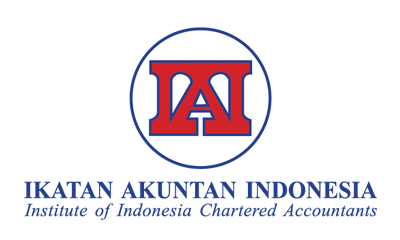PERBANDINGAN KUALITAS LABA PERUSAHAAN ANTARA PENERAPAN STANDAR AKUNTANSI DOMESTIK DENGAN STANDAR AKUNTANSI INTERNASIONAL
Abstract
Full Text:
PDFReferences
Alford, A., J. Jones; R. Leftwich; and M. Zmijewski. “The Relative Informativeness of Accounting Disclosures in Different Countries.†Journal of Accounting Research (Supplement 1993): 183-223.
Ashbaugh, Hollis, and Pincus, Morton, “Domestic Accounting Standards, International Accounting Standards, and the Predictability of Earningsâ€, Journal of Accounting Research Vol. 39 No. 3 December 2001.
Barth, Marye., Landsman, Wayner., and Lang, Mark H., “International Accounting Standards and Accounting Qualityâ€, Journal of Accounting ResearchVol. 46 No. 3 June 2008.
Choi, Frederick D.S. International Finance and Accounting Handbook, Third Edition, Jhon Wiley & Sons, Inc., 2003
Dimitropoulos Panagiotis E., and Asteriou, Dimitrios, “The Relationship between Earnings and Stock Returns: Empirical Evidence from the Greek Capital Marketâ€, International Journal of Economics and Finance Vol. 1 No. 1 Febuary 2009.
Financial Accounting Standards Board (1978). Objectives of Financial Reporting by Business Enterprises,†Statement of Financial Accounting Concepts No. 1 (FASB).
Hung, Mingyi, and Subramanyam K. R. (2004). Financial Statement Effect of Adoption International Accounting Standards: The Case of Germany. (2004)
Kusuma, Indra Wijaya, “ Pengadopsian International Financial Reporting Standards: Implikasi untuk Indonesiaâ€, Pidato Pengukuhan Jabatan Guru Besar pada Fakultas Ekonomi Universitas Gadjah Mada 2007.
Media Akuntansi. 2006a. IFRS Hanya untuk Cross Border Listing (Wawancara dengan M Jusuf Wibisana Ketua DSAK IAI). Media Akuntansi. Edisi September.
Watts, Ross L. and Zimmerman Jerold L., Positive Accounting Theory. Englewood Cliffs: Prentice-Hall, Inc, 1986.
Wolk, Harry I., James L. Dodd, and Michael G. Tearney (2004). Accounting Theory: Conceptual Issues in a Political and Economics Environment. South-Western, a division of Thomson Learning
DOI: https://doi.org/10.35591/wahana.v21i1.132
Wahana: Jurnal Ekonomi, Manajemen dan Akuntansi
ISSN : 2685-1415 (Online) | 1410-8224 (Print)
Published by Pusat Penelitian dan Pengabdian Masyarakat Politeknik YKPN Yogyakarta.
Jl. Gagak Rimang No. 2-4 Balapan, Yogyakarta 55222
Phone (0274) 560159, 562317, 513413, 563516 Fax. (0274) 561591
 This work is licensed under a Creative Commons Attribution-ShareAlike 4.0 International License.
This work is licensed under a Creative Commons Attribution-ShareAlike 4.0 International License.













